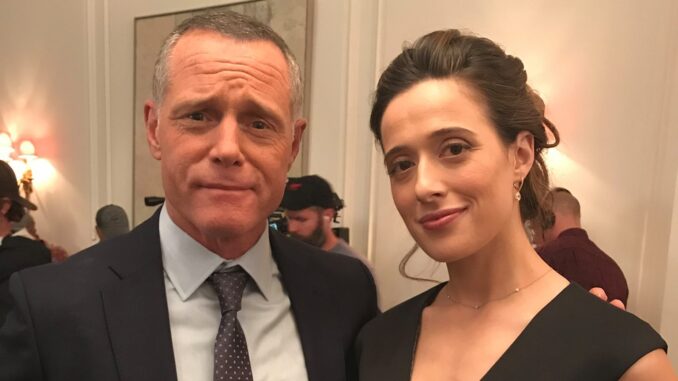
In the world of Chicago P.D., few characters command the screen quite like Sergeant Hank Voight. Portrayed masterfully by Jason Beghe, Voight is tough, complex, and unapologetically controversial — the kind of cop who bends the rules to protect his city, often blurring the line between justice and vengeance. But even for a character as hardened as Voight, certain moments shook him to his core and permanently altered the way he leads, loves, and lives.
Over the show’s 12+ seasons, Voight has faced betrayal, grief, guilt, and internal conflict — all while trying to keep his unit together. Here are eight pivotal episodes that didn’t just change the course of his character arc, but reshaped the entire DNA of Chicago P.D.
1. Season 1, Episode 1 – “Stepping Stone”
Before he became the conflicted protector fans came to love (or fear), Voight was introduced to audiences as a dirty cop on Chicago Fire. But Chicago P.D.’s pilot gave viewers their first real look at his world, his unit, and his brand of street justice. From the opening episode, Voight established himself as a man who would protect his city by any means necessary — even if that meant breaking the law to do it.
This episode laid the groundwork for everything that followed, showing a man still haunted by past choices but determined to make his unit a place where loyalty meant survival.
2. Season 2, Episode 10 – “Shouldn’t Have Been Alone”
This episode marked a turning point in how we understood Voight’s emotional depth. The aftermath of Nadia’s kidnapping and murder (from Season 2, Episode 20) was setting in, and though the Intelligence Unit remained focused, Voight began to crack beneath the weight of it all.
It was one of the first times we saw his inner turmoil bleed through his hardened exterior — not just as a boss or a cop, but as a man grieving a young woman he saw as a daughter figure. His brand of justice became even more personal, and even more dangerous, from this point on.
3. Season 3, Episode 1 – “Life Is Fluid”
In one of the most talked-about episodes of the series, Voight exacts brutal revenge on the man responsible for his son Justin’s death — and then buries him in the woods. It was raw. It was visceral. And it marked a moral spiral from which he would never fully recover.
Voight didn’t just lose his son; he lost the last piece of his soul that still believed in redemption. This moment cemented his reputation as someone willing to take justice into his own hands, no matter the cost.
4. Season 5, Episode 22 – “Homecoming”
No moment in the Chicago P.D. universe hit Voight harder than the death of his longtime friend and partner, Alvin Olinsky. Voight had put Olinsky in the crosshairs of a dangerous investigation, and when Olinsky was fatally stabbed in prison, the guilt was unbearable.
Voight’s grief turned into fury, and his need for vengeance once again overtook his judgment. This episode didn’t just shatter Voight emotionally — it began a slow unraveling of the man who once believed he could protect everyone close to him.
5. Season 6, Episode 22 – “Reckoning”
In Reckoning, Voight finds himself under serious scrutiny as his past actions catch up with him. The episode ends with a tragic twist, as Antonio Dawson’s struggle with addiction reaches a crisis point. While Voight tries to protect Antonio from the fallout, the episode reveals how far he’ll go to shield his team — even if it means bending every rule in the book.
This wasn’t just another day of covering for a colleague; it was the beginning of Voight questioning the legacy he was leaving behind.
6. Season 7, Episode 10 – “Mercy”
This emotionally intense episode finds Voight navigating a case that mirrors his own grief: a father driven to violent revenge for the death of his child. The parallels are striking, and for once, Voight’s empathy nearly overwhelms his sense of duty.
He begins to understand that his way of policing — one built on fear, intimidation, and retribution — might not be sustainable. “Mercy” doesn’t change him overnight, but it’s a subtle turning point in the evolution of his conscience.
7. Season 9, Episode 22 – “You and Me”
Jay Halstead, Voight’s most loyal team member, decides to leave Intelligence — and Voight — behind. Their relationship had grown into one of the show’s most compelling dynamics: the old-school sergeant and the morally grounded detective constantly clashing but deeply bonded. When Halstead makes the heartbreaking decision to leave, it’s not just a personnel change — it’s a symbolic loss. Voight is forced to reckon with how his influence has pushed others away, and how his way of doing things may no longer have a place in modern policing.
8. Season 10, Episode 12 – “I Can Let You Go”
After a season of emotional deterioration, I Can Let You Go brings Voight to a rare moment of vulnerability. He’s burned bridges, lost allies, and is struggling to lead a unit that’s seen too much darkness. In a poignant scene, Voight finally acknowledges that his own pain — left unspoken for years — has infected the very institution he tried to build. It’s not a confession, but it’s close. He begins to realize that survival isn’t just about outsmarting enemies or controlling chaos — it’s about confronting your past.
Hank Voight is far from the typical police procedural protagonist. He’s not always a hero. He doesn’t always do the right thing. But that’s what makes him such a compelling character. Each of the episodes above didn’t just impact Voight — they redefined him. Whether it was the pain of personal loss, the sting of betrayal, or the haunting cost of loyalty, these moments forced Voight to grow — or in some cases, regress — into the deeply flawed but fiercely devoted leader we see today.
